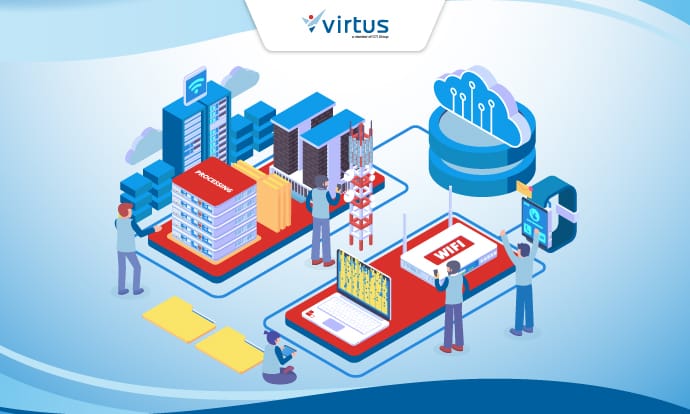Technology plays a vital role in accelerating business processes and creating competitive advantages. One of the technologies currently in the spotlight is Edge Computing. But what exactly is Edge Computing? How does this concept differ from traditional cloud computing, and most importantly, what benefits can your business gain by adopting this technology?
This article will answer these questions, providing a comprehensive understanding of Edge Computing and exploring how its application can enhance the efficiency and effectiveness of your business operations.
How Edge Computing Can Help Companies Modernize Their IT Infrastructure
Edge Computing has brought significant changes in how data is processed and managed within modern IT infrastructure. Traditionally, data processing took place in centralized data centers, which are often located far from the devices and sensors generating the data. In contrast, Edge Computing moves data processing and storage closer to the data source, minimizing latency and enabling real-time data processing. This paradigm shift is driven by several key factors:
1. Data Processing Optimization
Some applications, such as banking, fintech, mining, retail, or Point of Sales (POS), branch applications, and industrial automation, require instant decision-making. By processing data closer to its source, Edge Computing reduces the time needed for data to be sent to and from a remote data center, thereby significantly minimizing raw data. This is crucial for applications that rely on fast response times to ensure optimal performance and security.
2. Optimized Bandwidth
By processing data at the edge (the nearest devices or distribution points), organizations can reduce the volume of data that needs to be transmitted to centralized data centers. This means more efficient use of network bandwidth, reduced network congestion, and lower operational costs. Especially for applications that generate large amounts of data, such as video surveillance or the Internet of Things (IoT), bandwidth optimization plays a critical role in maintaining network performance.
3. Enhanced Data Privacy and Security
Edge Computing allows sensitive data to be processed locally on edge devices without needing to be sent to external data centers. This provides better control over data and enhances security, as critical data remains within the organization’s network. As a result, the risk of security breaches and data theft can be minimized.
4. High Scalability
One of the primary advantages of Edge Computing is its ability to scale flexibly. Organizations can easily add edge devices as needed, whether to support existing applications or to expand the overall IT infrastructure. This provides the freedom to adopt new technologies and adjust processing capacity as the business evolves.
By integrating Edge Computing into regional and central IT infrastructure, organizations can overcome the limitations often encountered in traditional architectures and achieve better performance. Faster processing, reduced load on networks, along with enhanced security and scalability make Edge Computing an ideal solution to meet the ever-evolving business needs in today’s digital era.
Read More: Understanding Edge Computing and Effective Strategies to Optimize Its Performance
Examples of Edge Computing Usage Across Various Sectors
Edge Computing has become a revolutionary solution in various industries by bringing data processing closer to the data source. This technology enables faster data processing, reduces latency, and improves network efficiency. Here are some examples of Edge Computing applications across different sectors:
1. Manufacturing
In the manufacturing industry, Edge Computing is used to support real-time monitoring and predictive maintenance in smart factories. With sensors installed on machines and equipment, the data generated can be processed directly on-site to detect anomalies or potential failures.
This allows operational teams to respond quickly before major failures occur, thus reducing machine downtime and maintenance costs. Additionally, edge data processing enables more precise process control, such as automatic adjustments of temperature or machine speed.
2. Healthcare
In the healthcare sector, Edge Computing plays a crucial role in remote patient monitoring and rapid analysis of medical data. Wearable devices or sensors attached to patients can send vital data such as heart rate, oxygen levels, and blood pressure to edge devices connected directly to hospitals.
This allows doctors to monitor patients’ conditions in real-time and provide faster interventions in emergencies. Furthermore, Edge Computing can process complex medical data, such as MRI or CT scan results, on-site, reducing analysis time and speeding up diagnoses.
3. Retail
In the retail industry, Edge Computing helps create a better shopping experience through personalized product recommendations and efficient inventory management. For example, edge systems can gather data from customer interactions in physical stores or online applications and analyze it to provide relevant offers in real-time.
Additionally, edge devices connected to sensors in warehouses or shelves can monitor stock availability and automatically reorder when supplies run low, preventing stockouts and reducing customer wait times.
4. Transportation
Autonomous vehicles and Intelligent Transportation Systems (ITS) heavily rely on Edge Computing for decision-making in seconds. Edge Computing enables extremely fast data processing from sensors such as cameras, radar, and LiDAR (Light Detection and Ranging) within vehicles. This data is used to recognize road conditions, avoid obstacles, and safely determine the best routes.
Since processing occurs directly in the vehicle without needing to send data to a data center, response times are significantly shorter, which is crucial for the safety of passengers and other road users.
5. Energy
In the energy sector, Edge Computing is implemented to optimize power grid management and renewable energy distribution. In smart grids, edge devices can process energy consumption data in specific areas and adjust power distribution in real-time to prevent blackouts or overloads.
For renewable energy sources, such as solar or wind, Edge Computing allows for local data analysis to balance energy production and consumption more efficiently. This helps reduce reliance on main data centers and enhances the reliability and sustainability of energy systems.
10 Recommended Edge Computing Solutions to Support Your Company’s Digital Transformation
With the right solutions, companies can enhance operational performance, reduce latency, and ensure better data security. Here are 10 leading edge computing solution providers that can meet your company’s needs along with their respective advantages:
1. Dell Technologies
Dell Technologies offers a comprehensive range of edge computing solutions that include hardware, software, and supporting services for various industries. Dell provides solutions capable of processing data close to its source, enhancing efficiency and responsiveness for edge applications.
Advantages:
- Integrated Hardware: Dell provides hardware that can serve as the foundation for IT infrastructure, such as servers, storage, networking, and backup solutions for data centers, as well as hardware specifically designed for edge applications, like ruggedized servers that withstand extreme environments.
2. Huawei
- Huawei offers presents edge computing solutions that support smart infrastructure for various industries, including transportation, energy, and manufacturing. Huawei leverages IoT, AI, and 5G network technologies to support more robust and reliable edge applications.
Advantages:
- Fast Connectivity with 5G Networks: Huawei combines edge computing with 5G technology to accelerate data processing and enable faster communication.
3. xFusion
xFusion provides high-performance GPU-based computing solutions designed to meet edge computing needs. The xFusion edge platform supports 5G application scenarios and enables heterogeneous computing to support the metaverse, cloud gaming, and AI.
Advantages:
- High Customization: xFusion customizes computing infrastructure according to specific application scenarios, allowing for better performance optimization.
- Heterogeneous Computing Solutions: Offers different computing capabilities to handle diverse workloads, from graphics-intensive applications to AI.
- Multi-Cloud and Multi-Edge Integration: Simplifies the management of various cloud and edge platforms within a single integrated ecosystem.
4. Arista Networks
Arista Networks is a leader in software-driven cloud networking. Arista’s edge solutions support network automation, security, and analytics with the CloudVision platform and EOS (Extensible Operating System).
Advantages:
- Full Network Automation: Arista provides intelligent network automation to facilitate the management of complex infrastructures.
- Advanced Monitoring and Analytics: The CloudVision platform offers deep visibility and analytics to monitor network performance and security in real-time.
- Global Scalability: Supports over 20 million network ports worldwide, providing scalability for large enterprise networks.
5. Schneider Electric
Schneider Electric offers edge computing solutions such as EcoStructure Micro Data Center (MDC), which focuses on compact data centers with monitoring software that prioritizes energy efficiency and sustainability, helping companies effectively manage IT infrastructure in remote locations.
Advantages:
- Energy Savings: Schneider’s solutions are designed to reduce energy consumption, making them suitable for continuously operating edge environments.
- Integrated Infrastructure Management: Schneider provides an integrated management platform that allows remote monitoring and management of power and environmental conditions.
- Modular Design: Modular solutions that allow for easy capacity expansion as needs grow.
6. Sophos
Sophos offers network security solutions optimized for edge computing environments. With Sophos Firewall, companies can protect data in edge areas from cyber threats with faster processing.
Advantages:
- AI-Based Security: Sophos uses AI to automatically detect and respond to threats in edge networks.
- Xstream Architecture Integration: Enables higher processing speeds to manage complex data traffic.
- High Security Automation: Capable of quickly identifying threats and blocking attacks without human intervention.
7. Palo Alto Networks
Palo Alto Networks provides robust cybersecurity solutions for edge and 5G environments. With automatic security integration capabilities, this solution ensures optimal protection against potential threats in edge areas.
Advantages:
- Integrated Security Platform: Combines traditional cybersecurity with security in edge and 5G environments for comprehensive protection.
- Adaptive Automation: Provides automatic protection that can dynamically adjust to new threats.
- Comprehensive Visibility and Control: Supports full control over applications and data in edge environments.
8. Ruckus Networks
Ruckus Networks integrates AI to support network infrastructure in edge areas. This solution ensures strong connectivity and low latency to support applications such as IoT, AI, and automation systems.
Advantages:
- Stable Network Infrastructure: Provides a reliable and high-capacity network to support edge-based applications.
- AI Optimization: Uses AI to optimize network performance and data traffic management.
- Enhanced Network Performance: Delivers higher network speeds and low latency.
9. Forcepoint
Forcepoint provides a robust behavioral-based data security solution to protect information transferring between edge and data centers.
Advantages:
- Superior Data Security: Protects sensitive data from leakage and attacks in edge areas.
- In-Depth Behavioral Monitoring: Detects suspicious behavioral patterns to identify potential threats.
- Strong Access Control: Manages data access rights to ensure that only authorized personnel can access sensitive information.
10. Confluent
Confluent offers data streaming solutions designed to support data processing in edge areas. This solution allows real-time data management from edge devices and supports IoT applications, video surveillance, and distributed networks.
Advantages:
- Real-Time Data Streaming: Enables the collection, processing, and analytics of real-time data from various edge devices.
- Large-Scale Support: Efficiently handles large volumes of data from diverse sources.
- Seamless Integration: Can integrate with various cloud platforms and existing infrastructure.
Start Your Digital Transformation Journey with Edge Computing Solutions from Virtus
At Virtus, we believe that every step in transformation is an opportunity to enhance performance and innovation. We are here to help you understand and implement Edge Computing, so your business can compete better in this dynamic market.
Our team of experts at Virtus is ready to provide in-depth and personalized consulting. We will work with you to analyze your company’s specific needs and assess the current state of your IT infrastructure. With an approach based on a deep understanding of your goals and challenges, we can design an appropriate Edge Computing solution. We understand that every company is unique, and thus, we are committed to offering relevant recommendations that can be smoothly implemented.
After the consultation phase, our team will support you in the implementation process with a structured and efficient approach. As an authorized distributor of leading brands such as Dell Technologies, Huawei, xFusion, Arista Networks, Schneider Electric, Sophos, Palo Alto Networks, Ruckus Networks, Forcepoint, and Confluent, along with our deep technical expertise, we ensure that every component is properly installed and functions optimally from day one.
Our commitment does not end after implementation. We believe that a good relationship with clients is key to long-term success. Therefore, Virtus offers responsive customer service and ongoing technical support to ensure that your edge computing solution continues to operate smoothly. Let’s join hands and begin your digital transformation journey with Virtus, so together we can create a more efficient, innovative, and sustainable future for your business. Click here to connect with us.
As part of PT Computrade Technology International (CTI) Group, we have built a strong reputation through our commitment to exceptional service, high responsiveness, and reliability for our business partners and end-users. Since 2007, Virtus has also provided comprehensive IT infrastructure solutions and services to support companies in their digital transformation journey, creating a more innovative and sustainable future.
Author: Ary Adianto
Content Writer CTI Group



























